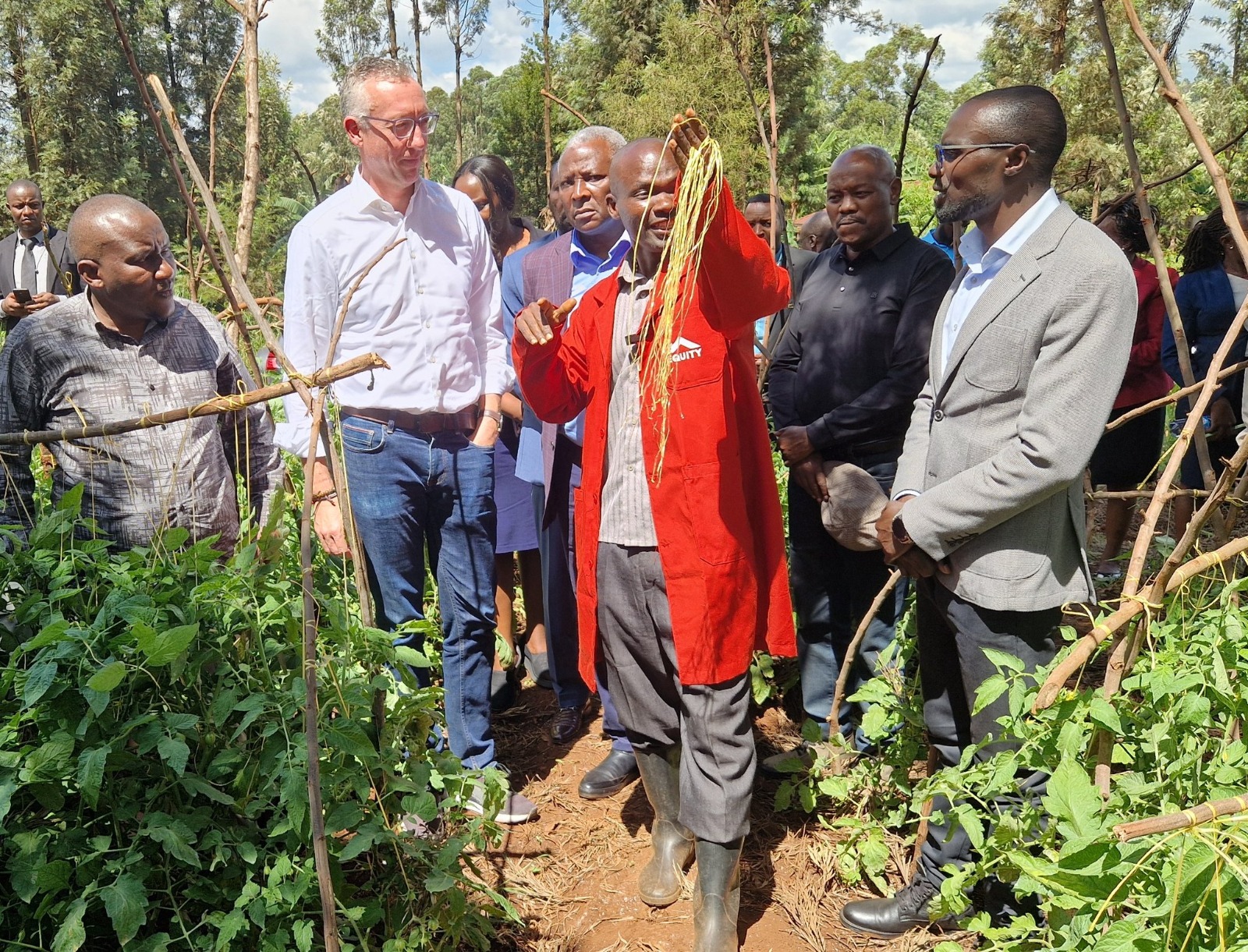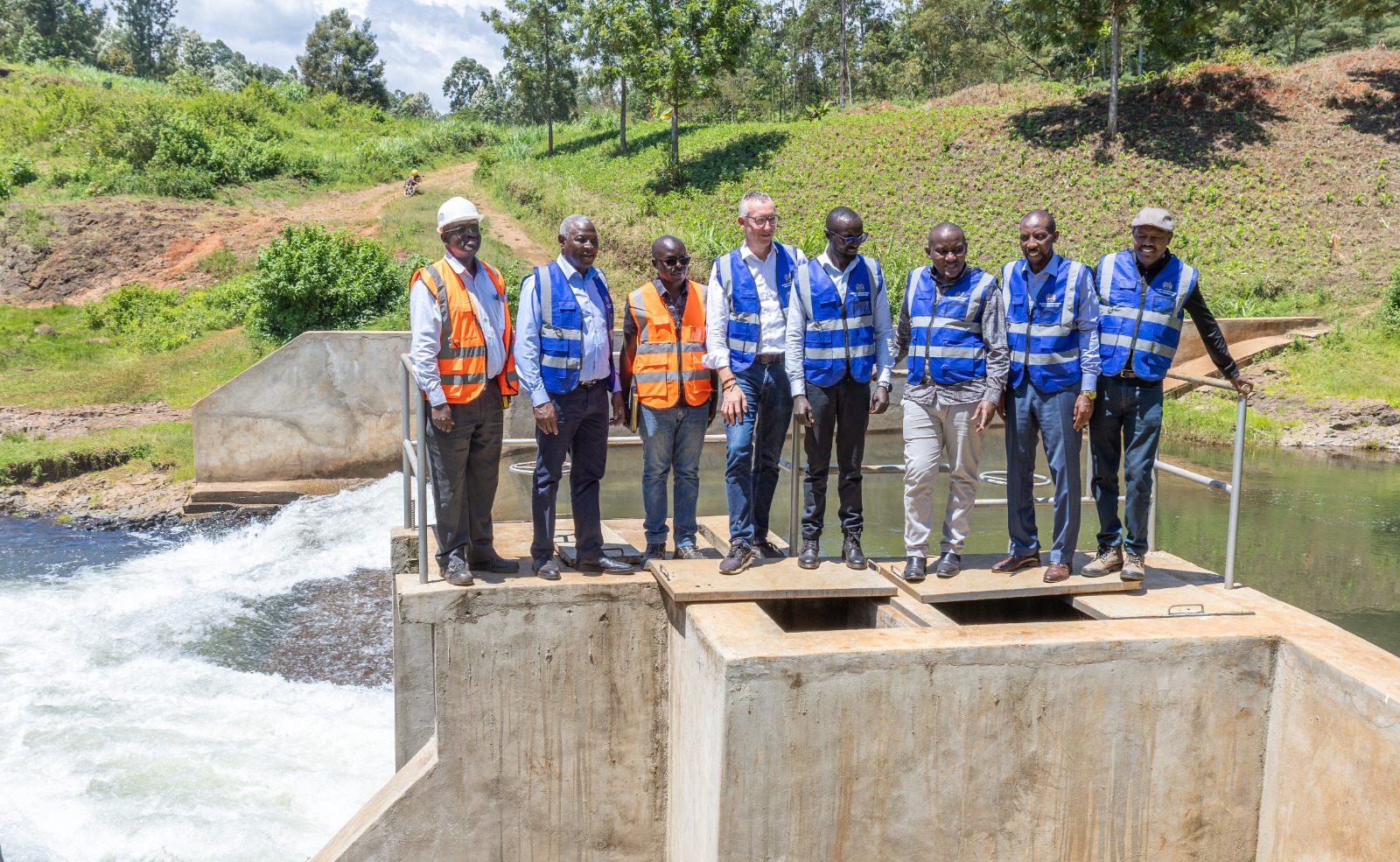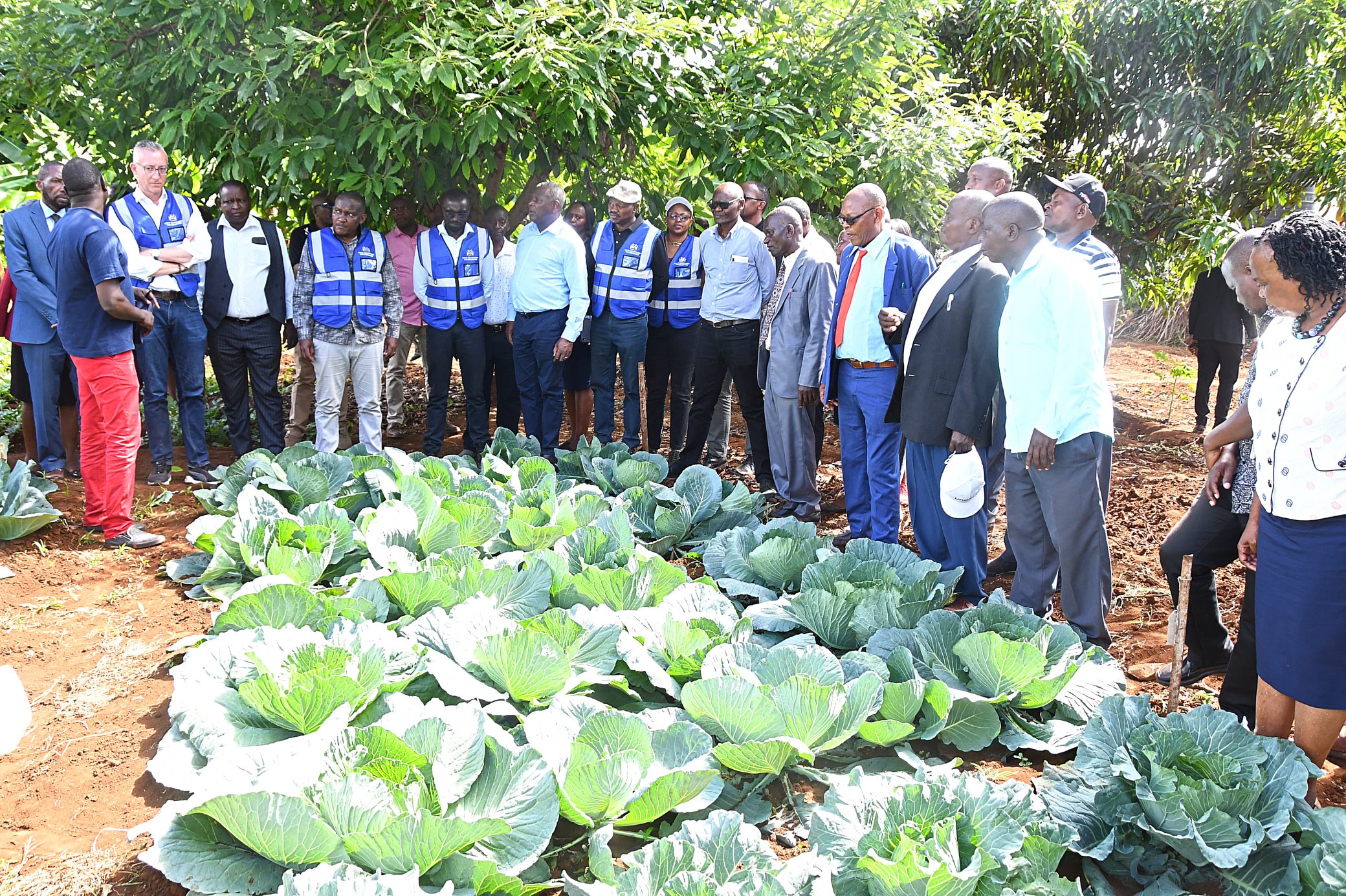
 Water PS Ephantus Kimotho, German ambassador to Kenya Sebastian Groth, Equity Bank CEO James Mwangi and Water CS Eric Mugaa follow a demonstration from Daniel Muriuki, a beneficiary farmer of Kandeki irrigation water project, at his tomato farm in Gachatha in Kirinyaga county./ALICE WAITHERA
Water PS Ephantus Kimotho, German ambassador to Kenya Sebastian Groth, Equity Bank CEO James Mwangi and Water CS Eric Mugaa follow a demonstration from Daniel Muriuki, a beneficiary farmer of Kandeki irrigation water project, at his tomato farm in Gachatha in Kirinyaga county./ALICE WAITHERAA project implemented by the government in partnership with the Equity Bank and the KFW Development Bank of Germany is transforming small-holder farmers’ livelihoods in the Mt Kenya region.
The Smallholder Irrigation Programme for the Mt Kenya (SIPMK) has seen 24 irrigation schemes established in the region, nine of them in Kirinyaga county.
In the third phase of the programme, the project has piloted Kandeki irrigation project that is benefiting 250 households.
Daniel Kariuki, one of the beneficiaries, said the project has transformed his family’s life and multiplied his income, enabling him to comfortably support his family.
Kariuki previously earned Sh15,000 from maize farming but has now shifted to close to a million in proceeds from tomato and French beans farming.
The project that channels water from Nyamindi river has enabled him to plant four times a year, further raising his income.
“I use sprinklers to irrigate my crops. I also have macadamia and coffee in another section of the farm and all are doing very well,” the farmer said, adding that the project has changed their lives for the better.
Speaking at his farm in Gachatha village, the farmer said
that over-reliance on rainfall is a major challenge to many farmers with
erratic weather occasioning them heavy losses and condemning them to poverty.
 German ambassador to Kenya Sebastian Groth (forth left) and Water and Irrigation CS Eric Mugaa lead a delegation of officials on a visit of Kandeki water project intake along the Nyamindi river in Kirinyaga/ALICE WAITHERA
German ambassador to Kenya Sebastian Groth (forth left) and Water and Irrigation CS Eric Mugaa lead a delegation of officials on a visit of Kandeki water project intake along the Nyamindi river in Kirinyaga/ALICE WAITHERAThe farmer currently employs 10 people in his farm, helping to create jobs and strengthen the local economy.
Water and Irrigation Cabinet Secretary Eric Mugaa pointed out that under the programme, the state funds 50 per cent while the Equity Foundation provides 40 per cent and farmers are provided with a loan from the bank to fund the remaining 10 per cent.
The model, he said, encourages farmers to work hard on their farms to raise their earnings and repay the loan from Equity Bank, unlike in projects that are fully funded by the sponsors.
Further, the foundation builds the farmers’ capacity to ensure they farm profitably and manage their earnings prudently.
“We’re happy to see these farmers flourishing. This particular farmer has said he’s expecting 200 crates of tomatoes from his farm, up from only earning Sh15,000 from maize,” he said.
He said the national government has plans to support small-holder farmers through such initiatives under the National Investment Plan launched a few months ago and linking them to aggregators.
Mugaa noted that high yield crops grown by the Kirinyaga farmers require market linkages to avoid losses.
“We’re doing 24 other irrigation schemes scattered across the region and the impact has been phenomenal. Food security of national importance and the government is doing its part and farmers have also to be committed to it,” he added.
He challenged farmers to consider adopting smart irrigation systems such as drip for precision and to reduce water wastage.
The CS confirmed the government also plans to replicate the project in 245 other areas as part of its efforts to empower farmers and boost production.
 A delegation of government officials and other stakeholders in Daniel Kariuki's farm in Gachatha village, Kirinyaga county/ALICE WAITHERA
A delegation of government officials and other stakeholders in Daniel Kariuki's farm in Gachatha village, Kirinyaga county/ALICE WAITHERA“This project will be a model on how we can empower smallholder farmers in such a way that one acre can sustain an entire family”.
Sebastian Groth, the German ambassador to Kenya, said the agriculture sector is the largest employer in the country, with over 80 per cent of local workers working in agriculture-related sectors.
Through the project, Groth stated that the partners will observe how farmers’ lives are impacted and help to implement more in other areas.
He noted that the project was piloted in Kirinyaga as its one of the country’s food basket, emphasizing its capacity to significantly raise agricultural productivity in the country.
“We have learnt that it’s possible to plant four times a year. We have also seen diversification of various crops to maximize returns,” he said.
Equity Bank CEO James Mwangi underscored the need for farmers to move from rain-fed agriculture to irrigation farming.
The project, Mwangi observed, makes agriculture sustainable and commercially viable, allowing farmers to shift from engaging in farming as a social activity.
With modern crop husbandry practices and diversification, Mwangi stated that farmers can drastically raise their proceeds and change their livelihoods.
“This is the future of agriculture in our country. It makes agriculture a profitable venture and makes it sustainable and we’re glad that with the World Bank’s support, the government will be able to expand this to over 200 schemes”.

















